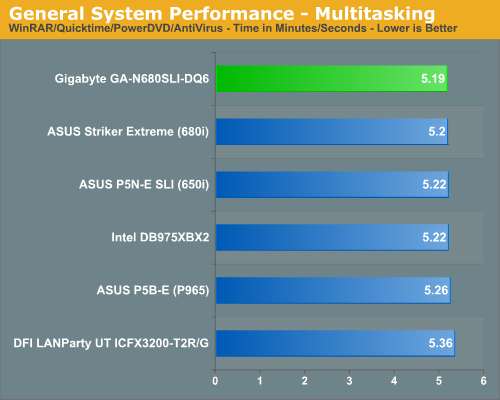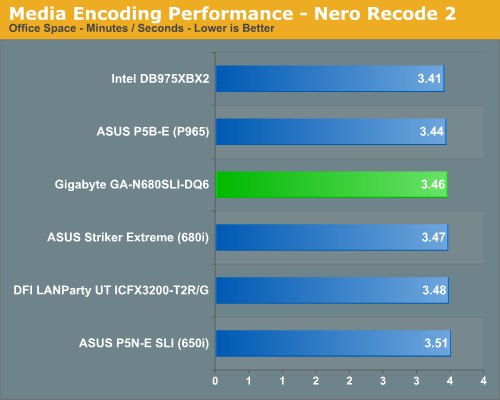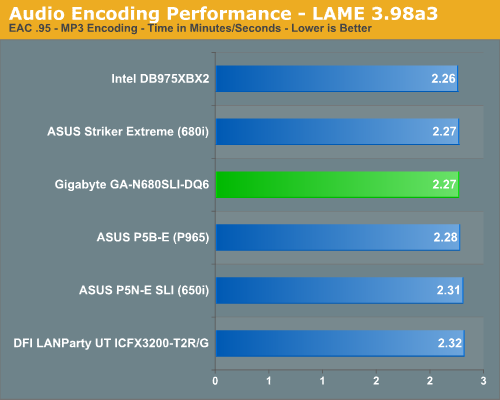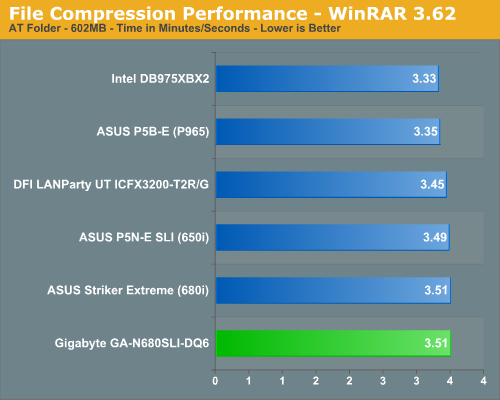Gigabyte GA-N680SLI-DQ6: Quad to the Extreme
by Gary Key on February 24, 2007 1:30 AM EST- Posted in
- Motherboards
General System Performance
We devised a script that would compress our standard test folder consisting of 444 files, ten subfolders, and 602MB worth of data, convert a 137MB High Definition QuickTime movie clip to a 37MB MPEG-4 format, play back the first two chapters of Office Space with PowerDVD, and run our AVG anti-virus program in the background. We stop the script when the file compression and video conversion are complete. This is a very taxing script for the CPU, Memory, and Storage subsystem. We also found it to be a good indicator of system stability during our overclocking testing.

The performance difference basically mirrors our PCMark 2005 tests with the 680i boards finishing first due to great disk performance, although the Intel chipsets consistently completed the QuickTime conversion first. The DFI RD600 board scores last although it generated the best video playback results. We also noticed it would stutter at times when converting the QuickTime file.
Media Encoding Performance
Our first encoding test is quite easy - we take our original Office Space DVD and use AnyDVD Ripper to copy the full DVD to the hard drive without compression, thus providing an almost exact duplicate of the DVD. We then fire up Nero Recode 2, select our Office Space copy on the hard drive, and perform a shrink operation to allow the entire movie along with extras to fit on a single 4.5GB DVD disc. We leave all options on their defaults except we disable the advanced analysis option. The scores reported include the full encoding process and are represented in minutes and seconds, with lower numbers indicating better performance.

We continue to see a strong performance from the Intel 975X in our application tests. In previous testing our ASUS 650i and 680i boards were almost two minutes slower in this test as we consistently found the performance of the 680i/650i to be lacking due to disk access issues. The conversion process would consistently slow down while the disk was being accessed. The quality of the video conversion was never affected but it appeared under heavy CPU usage that disk performance suffered. After the latest round of BIOS and driver updates these two boards now score close to the other chipsets.
Audio Encoding Performance
While the media encoding prowess of the P965 boards were superb in our initial media encoding testing, we wanted to see how they faired on the audio side. Our audio test suite consists of Exact Audio Copy v095.b4 and LAME 3.98a3. We utilize the INXS Greatest Hits CD that contains 16 tracks totaling 606MB of one time '80s hits.
We set up EAC for variable bit rate encoding, burst mode for extraction, use external program for compression, and to start the external compressor upon extraction (EAC will read the next track while LAME is working on the previous track, thus removing a potential bottleneck with the optical drive). We also set the number of active threads to two to ensure both cores are active during testing. The results are presented in minutes/seconds for the encoding process, with lower numbers being better.

As in the media encoding section, the more intensive CPU and storage system tests seem to favor the 975X over the P965/NV650i/RD600 when running at the same memory timings. Our two 680i boards are right on the heels of the 975X board with all scores being extremely close. Our Plextor drive consistently took two minutes and nine seconds to read all sixteen tracks. This means our test systems are only utilizing one core during testing until the midway point of the extraction process where the drive speed was exceeding the capability of the encoder and required the use of a second thread.
File Compression Performance
In order to save space on our hard drives and ensure we had another CPU crunching utility, we will be reporting our file compression results with the latest version of WinRAR that fully supports multi-treaded operations and should be of particular interest for those users with dual core or multi-core systems. Our series of file compression tests utilizes WinRAR 3.62 to compress our test folder that contains 444 files, ten subfolders, and 602MB worth of data. All default settings are utilized in WinRAR along with our hard drive being defragmented before each test.

In a complete reversal of the other application results we see our 680i boards finishing last. We see the Intel P965 and 975X chipsets leading once again as both seem to thrive in CPU intensive tasks. The DFI RD600 board continues to finish in the middle of the pack.
We devised a script that would compress our standard test folder consisting of 444 files, ten subfolders, and 602MB worth of data, convert a 137MB High Definition QuickTime movie clip to a 37MB MPEG-4 format, play back the first two chapters of Office Space with PowerDVD, and run our AVG anti-virus program in the background. We stop the script when the file compression and video conversion are complete. This is a very taxing script for the CPU, Memory, and Storage subsystem. We also found it to be a good indicator of system stability during our overclocking testing.

The performance difference basically mirrors our PCMark 2005 tests with the 680i boards finishing first due to great disk performance, although the Intel chipsets consistently completed the QuickTime conversion first. The DFI RD600 board scores last although it generated the best video playback results. We also noticed it would stutter at times when converting the QuickTime file.
Media Encoding Performance
Our first encoding test is quite easy - we take our original Office Space DVD and use AnyDVD Ripper to copy the full DVD to the hard drive without compression, thus providing an almost exact duplicate of the DVD. We then fire up Nero Recode 2, select our Office Space copy on the hard drive, and perform a shrink operation to allow the entire movie along with extras to fit on a single 4.5GB DVD disc. We leave all options on their defaults except we disable the advanced analysis option. The scores reported include the full encoding process and are represented in minutes and seconds, with lower numbers indicating better performance.

We continue to see a strong performance from the Intel 975X in our application tests. In previous testing our ASUS 650i and 680i boards were almost two minutes slower in this test as we consistently found the performance of the 680i/650i to be lacking due to disk access issues. The conversion process would consistently slow down while the disk was being accessed. The quality of the video conversion was never affected but it appeared under heavy CPU usage that disk performance suffered. After the latest round of BIOS and driver updates these two boards now score close to the other chipsets.
Audio Encoding Performance
While the media encoding prowess of the P965 boards were superb in our initial media encoding testing, we wanted to see how they faired on the audio side. Our audio test suite consists of Exact Audio Copy v095.b4 and LAME 3.98a3. We utilize the INXS Greatest Hits CD that contains 16 tracks totaling 606MB of one time '80s hits.
We set up EAC for variable bit rate encoding, burst mode for extraction, use external program for compression, and to start the external compressor upon extraction (EAC will read the next track while LAME is working on the previous track, thus removing a potential bottleneck with the optical drive). We also set the number of active threads to two to ensure both cores are active during testing. The results are presented in minutes/seconds for the encoding process, with lower numbers being better.

As in the media encoding section, the more intensive CPU and storage system tests seem to favor the 975X over the P965/NV650i/RD600 when running at the same memory timings. Our two 680i boards are right on the heels of the 975X board with all scores being extremely close. Our Plextor drive consistently took two minutes and nine seconds to read all sixteen tracks. This means our test systems are only utilizing one core during testing until the midway point of the extraction process where the drive speed was exceeding the capability of the encoder and required the use of a second thread.
File Compression Performance
In order to save space on our hard drives and ensure we had another CPU crunching utility, we will be reporting our file compression results with the latest version of WinRAR that fully supports multi-treaded operations and should be of particular interest for those users with dual core or multi-core systems. Our series of file compression tests utilizes WinRAR 3.62 to compress our test folder that contains 444 files, ten subfolders, and 602MB worth of data. All default settings are utilized in WinRAR along with our hard drive being defragmented before each test.

In a complete reversal of the other application results we see our 680i boards finishing last. We see the Intel P965 and 975X chipsets leading once again as both seem to thrive in CPU intensive tasks. The DFI RD600 board continues to finish in the middle of the pack.










12 Comments
View All Comments
tuteja1986 - Sunday, February 25, 2007 - link
ahh... english."Well Gigabyte GA-N680SL-DQ6 isn't even selling it. It will sale next month. They still have time to fix the bugs. Anyways i say buying the striker at launch for $400 was a foolish thing to do since it was buggy as hell. It took for them months to fix the problem."
correct :
Gigabyte GA-N680SL-DQ6 isn't even coming out untill next month so i think gigabyte has some time to address the issue and release an bios update for it.
tuteja1986 - Saturday, February 24, 2007 - link
If this board sell for $250 then i would buy it without a second thought. Much cheaper than Striker ; )